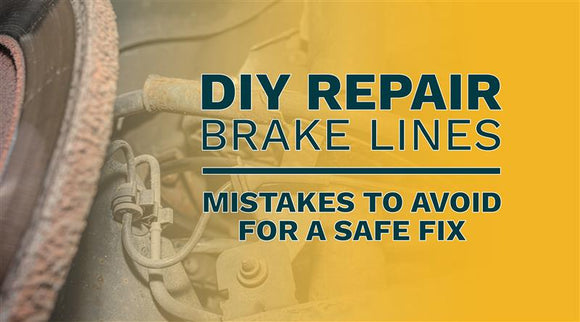
How to Extend the Life of Your Brake Lines: Expert Maintenance Tips
How to Extend the Life of Your Brake Lines: Expert Maintenance Tips
When it comes to brake line maintenance, your brake lines aren’t just parts—they’re the lifeline of your vehicle’s braking system. A single failure can compromise the entire system, and unlike worn brake pads or squeaky rotors, failing brake lines rarely offer a gentle warning. They snap, they leak, and your stopping power is gone.
The good news? With preventative care, you can dramatically extend the life of your brake lines, prevent corrosion, and avoid dangerous failures. Here’s how.
1. Commit to Regular Brake Line Inspections
Every 6 months—or at least during routine service—inspect your brake lines for:
Corrosion or rust (especially in road-salt regions).
Cracks or bulges in rubber brake hoses.
Moisture or leaks near fittings and junctions.
Don’t just glance at visible areas. Follow the lines along the frame, into wheel wells, and under the vehicle. Use a flashlight to catch bubbling rust, pitting, or worn brackets—early detection is the first step in brake line corrosion prevention.
2. Keep Your Brake Lines Clean
Road salt, grime, and moisture stick to brake lines and speed up corrosion. A simple cleaning routine can add years to their service life:
Use a gentle degreaser and soft brush to remove buildup.
Rinse thoroughly to clear away salt, especially after winter driving.
Avoid blasting fittings with high-pressure washers to prevent forcing water into seals.
Clean lines not only last longer—they make future brake line maintenance and repairs easier.
3. Apply Rust Protection & Brake Lubricant
Even high-quality NiCopp brake lines benefit from an added layer of defense. After cleaning:
Apply a rust-preventive coating to exposed metal.
Use brake lubricant on fittings, bleeder screws, and connection points to prevent seizing and make future service easier.
Reapply annually or more often in harsh climates.
This combo of rust protection and brake lubricant helps keep your braking system moving freely and corrosion-free.
4. Start with Quality Brake Lines
The best brake line corrosion prevention starts with superior materials. Standard steel works in mild climates, but if you face heavy road salt or moisture, NiCopp brake lines or stainless steel lines are a smart investment.
They resist rust far longer, maintain flexibility, and make fittings easier to service years down the road.
5. Don’t Overlook Clips & Hardware
Brake lines rely on clips, brackets, and grommets to stay secure. When these wear out, lines can rub against metal or vibrate excessively—eventually leading to cracks or leaks.
During each inspection, check hardware and replace anything loose, worn, or missing. It’s a small step that can save you from a major brake line replacement.
Final Word
Brake line maintenance is about more than keeping your vehicle running—it’s about keeping it safe. By inspecting regularly, keeping lines clean, applying rust protection and brake lubricant, and starting with quality materials like NiCopp brake lines, you’ll ensure your braking system is ready when you need it most.
For corrosion-resistant brake lines, fittings, tools, and brake lubricant that meet the highest safety standards, visit 4LifetimeLines.com.
